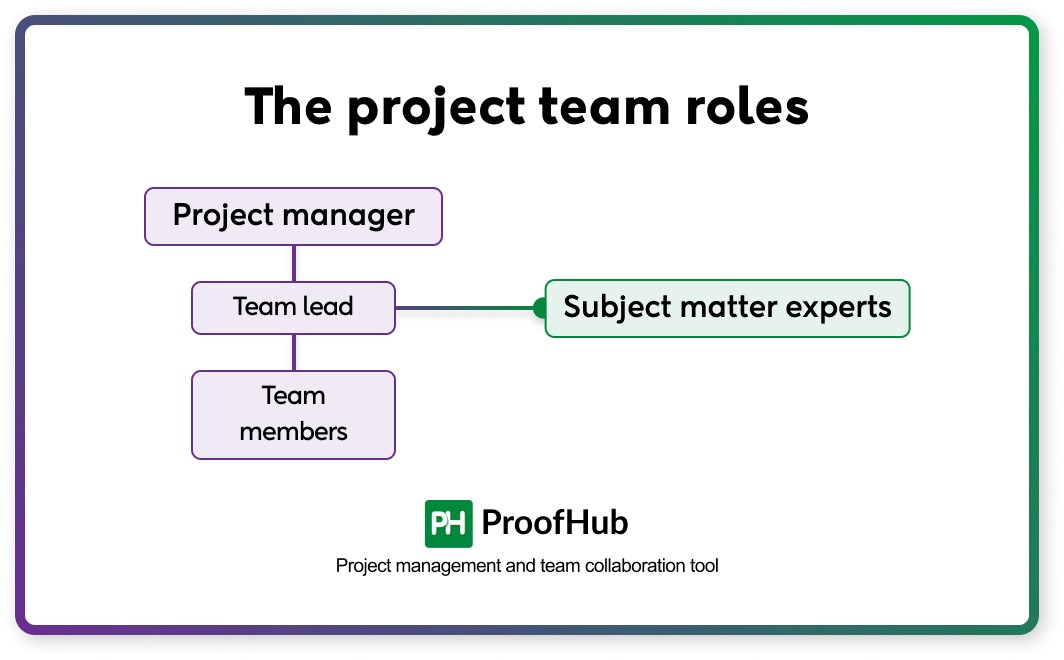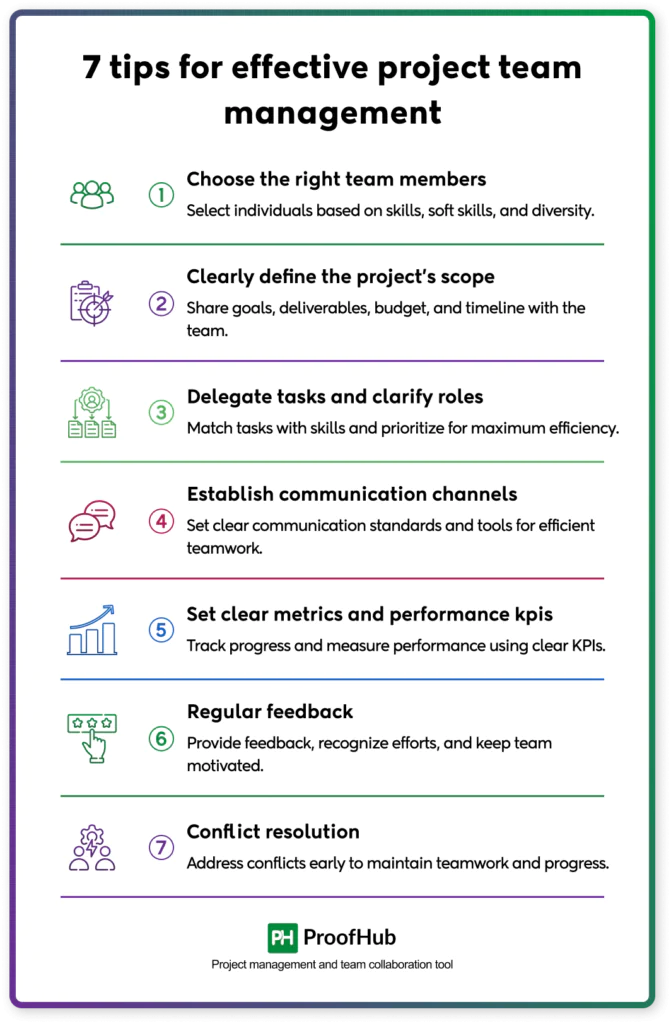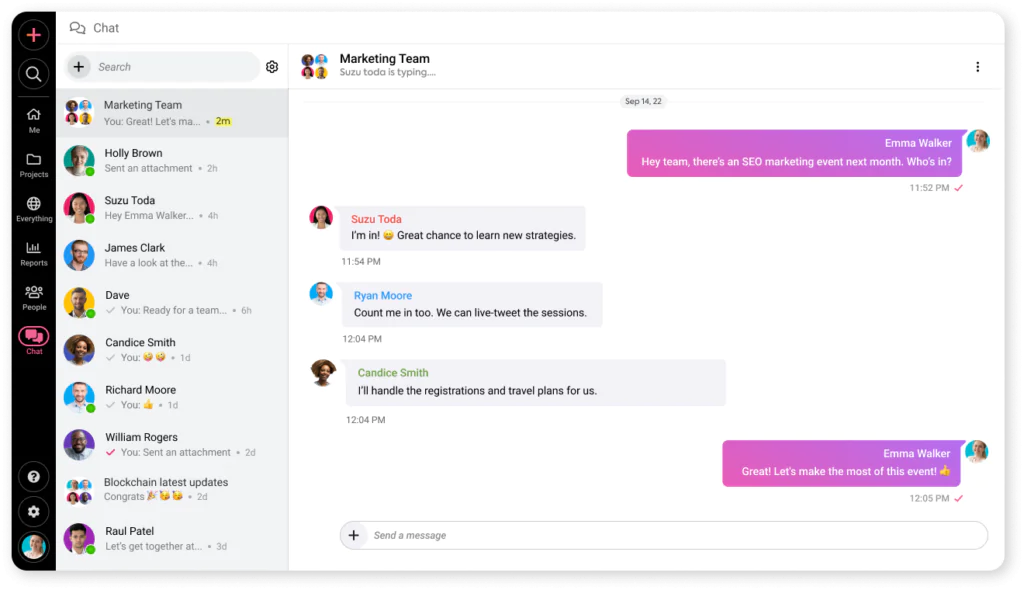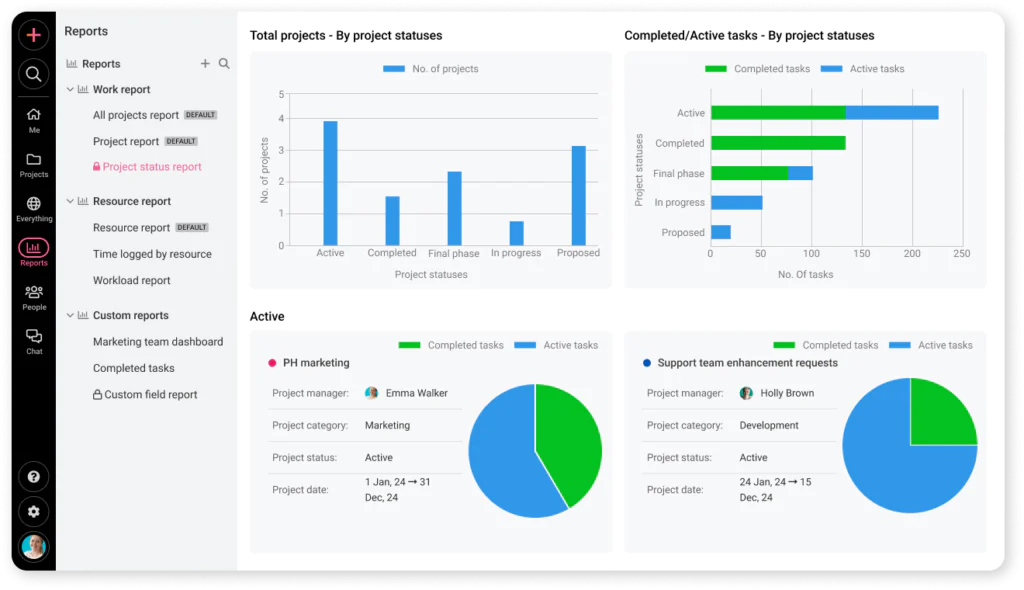The success of any project depends heavily on how well a project team performs. A project manager may create the best of the plan for a project, but without the right execution, even the best of the project management plan fails to deliver success.
Project team management is a knowledge area that focuses on making sure a project team has the right team members, everyone has a clear understanding of roles, responsibilities, and project objectives, and the project team is coordinating well.
In this chapter, we will learn about team management in detail and cover the importance of team collaboration in project success. Later in the chapter, we will talk about the new reality of team management. i.e., remote and hybrid teams.
What is team management in project management?
Project team management is the process of managing team members working on a project or somehow involved in working on a project. Every project requires certain team members to do the project work. For example, a software development project needs developers, testers, and designers. It is the role of the project manager to manage these team members to ensure the project’s success.
Understand the project team roles

In general, a project team has four core roles. Knowing about these roles is critical to understanding the role of each person in a project team and team dynamics in project management.
- Project manager: Guides the project from start to finish, aligning each aspect with the project scope and goals.
- Team lead: Oversees daily operations, coordinates between team members, and ensures tasks are executed smoothly.
- Subject matter expert: Brings specialized expertise to specific areas crucial to achieving project milestones
- Team members: Apply their skills directly to project tasks to complete project work.
Project team management provides the knowledge to organize and manage a team. It goes beyond the mere distribution of tasks. It includes creating a shared understanding of project objectives, clarifying roles and responsibilities, managing workload, facilitating collaboration, tracking performance, and resolving conflicts.
It may also include choosing the project team member and hiring new team members if the project team is not established yet. However, in most cases, a project manager is handed over to a project team to get the project work done.
Why do we need team management in a project?
A project team means people from different backgrounds, designations, personalities, and attitudes coming together to work towards a common goal. This leads to a series of challenges that a project manager needs to resolve to ensure project success. Have a look at the three primary challenges of project team management.
- Lack of shared understanding: Unclear project objectives, roles, and responsibilities; leading to confusion and conflicts.
- Miscommunication: Differences in personalities, work styles, and goals can lead to clashes, misinterpretation of information, and ineffective information sharing; resulting in miscommunication.
- Disengagement: Lack of appreciation, feeling of belonging to the team, and alignment with the project’s goals; leading to disengagement.
How to manage a project team? Seven tips for effective project team management

There are certain steps you need to follow for effective project team management. Have a look at them.
1. Choose the right team members
A beginner project manager is provided with the project team for the project in most cases. However, there are chances that you may have to select and choose the project team members, or even hire new individuals if the project team is not established yet. It is the responsibility of a project manager to select the right individuals for building a project team.
How to do it:
To form a successful project team, choose the team members based on the project needs and goals and identify the team members’ strengths. Beyond technical skills, consider soft skills such as adaptability, communication, critical thinking, teamwork, and motivation. A diverse team, with complementary strengths, will work together dynamically, making the project more successful.
2. Clearly define the project’s scope
The first step of project team management is to clearly define the project scope to the project team and how to work on the project. A project manager shares the project management plan with the team and explains it in a team meeting. The purpose of this step is to create a shared understanding of the project scope and bring everyone on the same page on how to work on it.
In a meeting, a project manager defines:
- Project goals: Primary outcome or the purpose of the project.
- Project objectives: Small objectives or steps to achieve the stated goal.
- Project deliverables: Outcomes a project produces when a team works on the project.
- Project scope: What is included and what is not included in the project.
- Timeline: Timeline for the project’s key phases, milestones, and deliverables.
- Budget: The total budget for the project.
- Dependencies: Key dependencies between the tasks of the project.
- Resources: Resources available to work on the project.
- Risks: Key risks and constraints of the project.
This helps the team gain an understanding of what a project aims to achieve and a rough outlook on how a team is going to achieve it.
How to do it:

Tools like the Gantt chart help a project manager visualize the project management plan, dependencies, and impact of the delays on the project.
This step leads to the next question, what is the role of each team member in a project?
3. Delegate tasks and clarify roles and responsibilities
This is the most important step of project team management where a project manager delegates the task to the team members and clarifies the roles and responsibilities of each team member.
To make best use of the project team members capabilities, it is important for a manager to delegate the tasks to the team members considering:
- an individual team member’s skills and expertise and matching tasks to team members’ strengths
- the complexity and priority of each task
- current workload and capacity
This helps a project manager maximize efficiency. It is often advised to involve team members while delegating tasks to create the most effective resource allocation plan.
A project manager clarifies the roles, responsibilities, and expectations of each project team member in a project. This step aims to clarify the team and bring the entire project team on a common ground for the project’s success.
How to do it:
You can use a task prioritization method like the Eisenhower matrix to prioritize tasks based on urgency and importance and delegate them to the team members according to their skills. To define roles, you can use the RACI matrix. It is a chart that defines who is Responsible, Accountable, Consulted, and Informed for a task.
4. Establish channels of communication and clear communication protocols
A project team performs better when they work together. Clear and consistent communication ensures all team members are informed, sharing progress updates, addressing challenges and roadblocks, and aligning priorities to work together toward common goals.
To ensure effective working within a team, it is very important to establish standard channels of communication and clear communication protocol for every channel. This ensures every team member knows when, how, and what to use for each channel.
This helps streamline team communication, facilitate hassle-free information sharing, and avoid miscommunication. It results in improved productivity, efficiency, and accountability.
How to do it:

You can use digital collaboration tools like ProofHub, Slack, and Zoom to facilitate team communication. It provides you with multiple channels of communication, such as chat, project discussions, video conferencing, and notes to streamline and record communication.
5. Set clear project metrics and performance KPIs
Team management is not as simple as it seems. You define what a team needs to do, provide them with the tools, and everything is fine. In the real world, you face a lot of challenges such as team conflicts and poor performance. Therefore, it is crucial to track the team’s performance and project progress.
Clearly define the metrics and KPIs used to measure a team member’s performance and track project progress. It brings clarity to the team members on the expectations and how their contributions will be measured.
It also helps project managers make key decisions related to the project:
- help track a project’s progress and reschedule resources to keep projects on track
- and monitor each team member’s contributions, manage workload, and help them support if they are facing challenges.
How to do it:

Use project management software to set KPIs and performance metrics to track progress. It provides you with a dashboard and reports that automatically collect project data to help you measure progress.
6. Regular feedback and consistent recognition
A manager has to play the role of leader in team management. Every manager can create an effective resource allocation plan with decent knowledge. But to bring the best out of the team, the project team members need to feel appreciated, motivated, and belonged to work towards the common goals. That’s where the soft skills like leadership of a project manager come into play.
Regular feedback is the best way to interact with the team from time to time and keep them motivated. These regular feedback sessions keep the lines of communication open with project managers and project team members.
How to do it:
A manager can conduct a weekly, monthly, or key milestone feedback session with the team reflecting on what went well and what needs improvement. If you identify skill gaps, facilitate training or mentoring. This is also the time to recognize hard work. Appreciate efforts to make team members feel valued and heard.
7. Conflict resolution
Diverse personalities, different work styles, and varying communication preferences are some of the real-world attributes that come with teamwork. Thus, conflict is the natural consequence. If not addressed, conflicts can lead to broken communication lines, siloed working, and poor collaboration; derailing the project’s progress. A project manager needs to practice active conflict resolution to address disputes or misaligned priorities among team members.
How to do it:
Create a culture of open communication where team members can reach you for any concerns. Regular feedback sessions, team-building activities, and team surveys can help you resolve conflicts.
Benefits of team management in project management
Team management is a critical aspect of project management and is integral to the success of any project. Have a look at the key benefits.
- Alignment on project goals: Enhanced clarity on project goals and roles and responsibilities ensures all team members are aligned and working effectively.
- Improves efficiency: Enhanced coordination and collaboration among team members and better utilization of individual strengths and expertise improve efficiency in task completion.
- Complete a project on time and budget: A well-managed team is more likely to meet deadlines, solve problems effectively, and produce high-quality results.
- Reduced misunderstandings: Clear communication channels reduce misunderstandings.
- Higher quality deliverables: Streamlined processes and workflows produce higher quality deliverables.
- Improved risk management: Resources are allocated efficiently, potential issues are identified early, and the project stays on course.
- Better teamwork: Enhanced problem-solving capabilities through collective efforts, increased morale and motivation within the team, and builds a sense of ownership and accountability among team members.
Importance of collaboration in team management
Collaboration is the practice of sharing ideas, knowledge, and information to achieve shared goals. Working on a project is complex and includes various moving parts: stakeholders, team dynamics, and changing requirements. Collaboration makes it easy to handle project challenges by creating a collaborative environment for teamwork.
Here are the key points highlighting the importance of collaboration:
- Higher productivity with free flow of information: When individuals come together, combine their skills, ideas, and expertise, and share information freely, it results in higher productivity because everyone is on the same page and working toward the same goal.
- Break down silos to reduce inefficiencies: Collaboration helps break down silos within the organization and facilitates knowledge sharing across different departments or teams. It ensures that priorities are aligned, messages are consistent, and timelines are met.
- Better decision-making with innovation: Collaboration enables faster problem-solving as team members share diverse perspectives and challenge each other’s thinking. This exchange often leads to creative solutions that one individual might not achieve alone.
- Improved employee experience: Effective collaboration fosters a sense of belonging and trust among team members. When people feel heard and valued, their engagement and job satisfaction rise. Happy and motivated employees are more likely to contribute their best efforts, strengthening the team as a whole.
- Cultural understanding and embracing diversity: Collaboration often brings together individuals from diverse backgrounds, cultures, and experiences. Working closely with colleagues from different demographics fosters cultural understanding, empathy, and appreciation for diversity. It helps massively in preventing conflict and conflict resolution.
Team management and collaboration in hybrid and remote settings
Hybrid and remote teams bring unique challenges to team management and collaboration. It is because the absence of face-to-face interactions makes it hard to bring clarity, create a shared understanding, and bring everyone on the same page.
However, with the right technology and clear communication norms, you can ensure effective team management and collaboration in remote and hybrid teams.
Here is what you need to do for managing hybrid project teams effectively:
- Clear norms for project work and communication: Establish clear norms for project work and communication. It includes clearly defining how the work will be allocated, tracked, and managed, expectations from team members, and guidelines for communication and using each communication channel. For example, clearly defining what constitutes an “urgent” task ensures team members are on the same page. Similarly, clearly defining what discussion happens over email, chat, or meeting to prevent the chaos of fragmented communication.
- Use collaboration tools: In a remote or hybrid work setting, your tools are your workplace. Use collaboration tools to share information and communicate with the team. Involve team members in the deciding collaboration tool and providing training to use the tool. It helps reduce the reluctance to adopt technology.
- Regular check-ins: Isolation and disengagement is the biggest challenge in remote teams. Make sure remote team members feel included and valued. Regularly check in with them to ensure they have the resources they need and that their voices are heard.
ProofHub: A tool for team management and collaboration in project management
Team management and collaboration in project management is a discipline that spans the entire project lifecycle and covers almost every area of project management. Thus, without a digital project collaboration tool, it is hard to implement various techniques, tricks, and processes involved in team management and collaboration in project management.
Let’s understand how project management and team collaboration software like ProofHub can help.
1. Create and share project objectives with the team
The first step of team management is to bring clarity on the project objectives. A project manager can share the key project documents like project scope statements, project management plans, and risk registers under one place in a project in ProofHub. This creates a standard and single source of information for every team member.
2. Clearly define roles and responsibilities with task management
With ProofHub’s task management tool, a project manager can break a project into task lists, tasks, and sub-tasks. This replicates the work breakdown structure created in the planning stage.
You can add the task assignees, estimated cost and time, task description, and other information required to complete a task at the lowest level of WBS.
This helps a project manager implement the entire project plan and team members get clarity on roles and responsibilities, enhancing accountability.
3. Bring clarity with collaboration
ProofHub brings the entire work to a centralized place. A project manager can view all the tasks in a project at a glance in a Kanban board view or Table view.
The best thing is that ProofHub creates a dedicated tab for each task that showcases all the details of the task. You can mention task assignees in the comment section of the task and attach files. This helps streamline collaboration and bring clarity which is vital for team management.
Along with communication tools like real-time chat and project discussion, you can ensure the project team is well coordinated.
ProofHub keeps a record of every interaction. This helps in conflict resolution as you can clearly track all the changes and updates.
4. Track project progress and team performance with reports
With all of your project data in one place, ProofHub automatically creates detailed project reports by assignee, task status, and time utilized. This helps you track project progress and team performance, make analysis, and reschedule resources to keep the project on track.
5. Manage workload with calendar and charts
With tools like a ‘Project calendar‘ and ‘Gantt chart‘, a project manager can visualize resource allocation plans and project management plans. This helps you manage workload and identify key dependencies of the project to make key project resource-related decisions.






